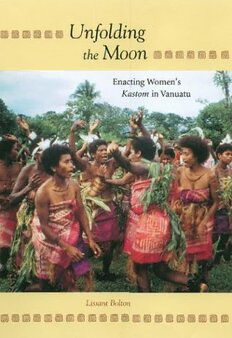
Unfolding the Moon: Enacting Women's Kastom in Vanuatu PDF
274 Pages·2003·2.078 MB·English
Most books are stored in the elastic cloud where traffic is expensive. For this reason, we have a limit on daily download.
Preview Unfolding the Moon: Enacting Women's Kastom in Vanuatu
Description:
Unfolding the Moon is a lucid and engaging account of a quiet but crucial transformation in the status of women in Vanuatu. In the first decades after independence in 1980, kastom--indigenous knowledge and practice--became a key marker of ni-Vanuatu identity. Long used as a unifying force against the Anglo-French expatriates by leaders of the independence movement, kastom was almost entirely concerned with men: women were effectively excluded from participating in arts festivals, cultural programs, and other new national events. Then in 1991 the Vanuatu Cultural Centre initiated a project that focused on women's knowledge and skill in producing plaited pandanus textiles (mats) on the island of Ambae in north Vanuatu. This acknowledgment that "women have kastom too," widely welcomed by rural ni-Vanuatu, was an important step in establishing women's kastom. Lissant Bolton's account of this important but undocumented period considers the circumstances that led to these events and analyzes their effects on Ambae. Her ethnography of women's production and use of plaited pandanus textiles shows a changing world whereby colonial and missionary ideas about the position of women and feminist discourses on women's rights have engaged with specific, kinship-based constructions of gender to create contemporary ni-Vanuatu views on the position of women. These views have been further modified by the independence movement and then, through the widespread influence of the Vanuatu Cultural Centre, by Western anthropological assumptions about culture. Bolton analyzes all of these interactions as well as her own engagement in the very processes she describes. The result is a readable yet sophisticated account of how ni-Vanuatu women stepped forward into the national arena and unfolded their knowledge and practice as kastom.
See more
The list of books you might like
Most books are stored in the elastic cloud where traffic is expensive. For this reason, we have a limit on daily download.
